“Pivot from crypto to AI” became a refrain in Silicon Valley after ChatGPT launched in 2022. Opportunistic founders looked to jump from one flagging hype cycle to the newer, shinier thing in tech. Vladimir Novakovski, though, pivoted from AI to crypto—and he’s attracted a who’s who of investors to back his startup Lighter, one of the fastest growing projects in digital assets.
Lighter is both a decentralized exchange designed to not be controlled by a single entity as well as a blockchain. It allows users to trade perpetual futures, a type of derivative that lets traders speculate on future prices for cryptocurrencies. It will also soon roll out spot trading for tokens like Bitcoin, Novakovski said.
On Tuesday, Lighter announced that it has raised $68 million in a new funding round. According to the 40-year-old Novakovski, who founded Lighter in 2022 and serves as CEO, the fundraise was led by Peter Thiel’s Founders Fund and the fintech investor Ribbit Capital. Other participants included Haun Ventures and the online brokerage Robinhood, which rarely makes venture investments.
The round valued Lighter at around $1.5 billion, according to two sources familiar with the deal, who asked for anonymity to discuss private business dealings. Novakovski declined to comment on Lighter’s valuation but said the deal was for equity and token warrants, or allocations of a yet-to-be-released cryptocurrency.
“What we want to do is to be the infrastructure layer that verifies that everything that happens in finance happens fairly, happens correctly, happens transparently,” Novakovski said in an interview.
Trading to AI to trading
The fundraise for Lighter comes amid a wave of buzz for crypto “perps,” or perpetuals. These are derivatives popular in the crypto industry and let traders hold futures contracts that don’t expire, provided they maintain the necessary margin requirement.
While so-called perps have been around for years, the recent rise of Hyperliquid, another decentralized exchange, has shaken up the market. With only 11 employees, Hyperliquid cofounder Jeff Yan managed to challenge centralized behemoths like Binance, which has responded by closely aligning itself with its own Hyperliquid competitor: Aster.
Lighter is entering an intensely competitive market, but Novakovski has the intellectual chops to compete. “Vlad and the team that he’s built is like 85% to 90% of why we made the investment,” Joey Krug, a partner at Founders Fund, told Fortune.
After Novakovski immigrated from Russia to the U.S. as a child, he won a place on the U.S. national teams for the International Olympiad in informatics and physics. At the age of 16, he went to Harvard, graduated early, and, at only 18 years old, began working at the hedge fund Citadel Investment Group. (Ken Griffin, CEO of Citadel, personally recruited him, Novakovski said.)
Novakovski then had an almost 15-year career at various companies as an engineer and trader before he became a founder himself. In 2017, he and Scott Wu, whom Novakovski previously worked with at the investment firm Addepar, founded their own startup together: Lunchclub, an AI-powered platform for social networking.
They raised around $30 million, and, in the beginning of the pandemic, saw their product attract a swathe of isolated users looking to meet new people. But, in 2022, growth plateaued. “We had three paths, which is: try to make it into something profitable but small, try to figure out a way for it to go from what it was to like a TikTok or Snapchat, which didn’t seem particularly viable,” said Novakovski. “The third path: to pivot to something else we were really excited about.”
Wu left Lunchclub to found the AI coding startup Cognition, which has since notched a valuation of $10.2 billion, and Novakovski decided to return to his roots as a trader.
He pivoted Lunchclub to Lighter, retained 80% of the team, and raised a new stash of capital: $21 million in a previously unreported round in 2024 led by Haun Ventures and Craft Ventures. Other participants included Dragonfly and Robot Ventures. That, combined with Lighter’s most recent round, puts the amount that Lighter has raised so far at almost $90 million.
After two years of development and testing, he launched Lighter in January. As opposed to Hyperliquid, which runs on its own layer 1 blockchain, Lighter runs on its own layer 2 on Ethereum, which Novakovski mentioned as a key distinguisher between the two competing products.
Lighter’s blockchain has quickly become one of the top layer 2 blockchains on Ethereum by total volume locked, or the total amount of funds on a blockchain, according to data from the crypto analytics site L2BEAT. And his business is already profitable, Novakovski said. “We’re pretty happy about our position right now,” he added, when asked about how his product compares to Hyperliquid, “but we’re working hard.”
